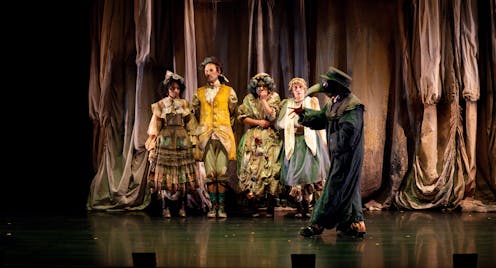A new stage adaptation of Peter Carey’s Jack Maggs is a delightful homage to theatrical storytelling
- Written by Catherine Campbell, Lecturer, Performing Arts, UniSA Creative, University of South Australia

Jack Maggs is a delight and a homage to theatrical storytelling in Australia.
Based on Peter Carey’s bestselling novel, Jack Maggs follows the ex-convict as he lands back in London and sets out to find his “son”. Adapted by Samuel Adamson for the State Theatre Company of South Australia, Adamson’s layered play tells the story of Maggs’ return through the eyes and perspective of Mercy Larkin, the maid.
Carey’s novel is a retelling of Dickens’ Great Expectations, so the resonances telescope further and further as we are brought into the world of Dickensian London, and its brutal counterpart in New South Wales.
Brilliantly directed by Geordie Brookman, the world he creates is lively, physically inventive and glorious. With a nod to early Australian theatre, Georgian London footlights and grime, the worlds of Sweeney Todd and Oliver Twist, Brookman’s ensemble are comic, heartbreaking, immersed and transformative.
We are never allowed to forget, however, that this is a story and in the telling, the world is all smoke and mirrors.
Brookman and Adamson centre our focus on the idea of “home” and the search for that sense of homecoming within ourselves. Every person in the audience who has ever longed to go back to “the mother country”, whatever that is for them, shared in Maggs’ determination to shake off his convict past and embrace his home. Maggs however finds his home is a chimera, where he is reviled, tricked, cornered and shut out.
Actors as storytellers
The play begins with the actors as storytellers: we enter the theatre to find actors, wearing 18th century white(ish) well-worn underwear, warming up and wandering the stage.
They transform into the characters by putting on a costume item or two, tell the story, and return at the end to speak to us as actors.
By reframing the narrative as Mercy Larkin’s story, which ends up in colonial Australia, we are reminded of how many of colonial “success stories” had brutality at their start.
The ensemble appear suddenly to give melodic voice to the horrors in ex-convict Maggs’ head, to sing colonial ballads and to create unsettling or comic street scenes. Brookman has them changing scenes in choreographed or cheeky movements, creating sound effects from the sides, singing in harmony, creating set pieces and staging shadow puppet plays to help tell the gothic parlour stories contained in Maggs’ story.
Ahunim Abebe is theatre magic as Mercy Larkin. She shines, sparkles and charms, moving effortlessly from knockabout nosy maid to stillness and sorrow, directly addressing the audience. Then, in a heartbeat, sitting within an intimate monologue.
Mark Saturno’s Maggs is mesmerising, unsettling and enigmatic, and one of his best performances from an impressive list of credits. His slow revelation of the layers of love and hurt beneath the formidable exterior, peeled away by Mercy’s insistence, is thrilling to watch.
Theatre icon Jacqy Phillips is wonderful as Old Mercy, Ma Britten and Mrs Halfstairs. She revels in the physicality and vocal qualities of each character. You can’t take your eyes off her; it is a joy to see her on stage.
Dale March, Nathan O’Keefe, Rachel Burke and Jelena Nicdao are all excellent, multitalented performers. They find depth, humour, pathos and comedy in their contrasting characters, seamlessly moving from scene to scene and story to story. O’Keefe’s physical comedy as the spineless Percy Buckle is masterful.
As the Dickens figure Tobias Oates, James Smith revels in the desperate and social-climbing writer, thoroughly enjoying the morally murky depths of Carey’s “story thief”. His “mesmerist” scenes with Maggs, where he records the convict’s story without his knowledge, are horrific while entrancing. The writer’s obsession is palpable.
The use of what’s to hand
Dominating the stage is a massive patched curtain, reminiscent of a much-mended sail from a tall ship. Raised on command at the beginning of the play, it creates backdrops for rooms, walls of streets and houses, and the shadow puppet screen.
The use of “what is to hand” to make costumes, sets and character reminds us Australian theatre itself started with convicts (a production of The Recruiting Officer in 1789).
Ailsa Paterson’s detailed design is a symphony of the “mend and make do” reality of both the penal colony and of theatre: old, patched once-grand costumes are hitched, tied, bunched and tacked on in a delicious riot of theatrical invention.
The audience willingly colludes in the suspension of disbelief to create the characters’ finery and the set: hanging garments from a large Georgian furniture frame become curtains in a coach, cupboard doors become front doors, desks and chairs whisk past stationary characters to show the passing of time.
Nigel Levings’ detailed and rich lighting design wonderfully invokes the grimy, fog-filled streets, Maggs’ sudden pain and nightmare voices, storms, stuffy genteel houses, and candlelit drawing rooms.
Music elements are woven throughout, expertly set and arranged by Hilary Kleinig. The use of colonial ballad-style singing, using words from Maggs’ story as lyrics, is inspired.
Opening night of Jack Maggs was on International Men’s Day. The juxtaposition of a play about a man by a man, based on a book by a man, in response to a book about a man, by a man, meant centring the story as Mercy Larkin’s – without developing her story or character except in relation to Maggs’ – wasn’t quite enough to address gender imbalance in this particular story.
It is nonetheless an impressive production. Jack Maggs is energised, playful, multi-layered theatre; so thoroughly enjoyable that, at interval, I wanted to go back in and see the first half again.
Jack Maggs is at the State Theatre Company of South Australia until November 30.
Authors: Catherine Campbell, Lecturer, Performing Arts, UniSA Creative, University of South Australia





